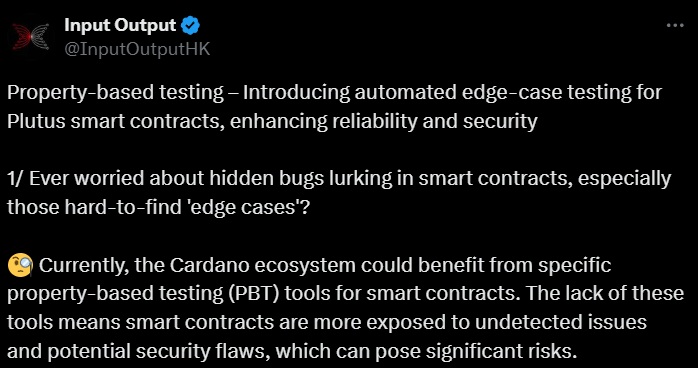TL;DR
- Cardano launched Plinth, a tool that automates smart contract testing to detect bugs in atypical scenarios.
- The tool uses property-based testing and integrates into the Plutus workflow without requiring modifications, streamlining development.
- Plinth fills a gap in Cardano’s infrastructure and reduces operational risks by identifying issues before deployment on the blockchain.
Cardano has introduced a new tool aimed at improving the security of the smart contracts built within its ecosystem.
It’s called Plinth, a resource that automates testing for contracts written in Plutus, with the goal of uncovering rare flaws that could trigger vulnerabilities once deployed on the network.
How Does Plinth Work?
Plinth uses a method known as property-based testing, which automatically generates a wide range of inputs to evaluate how a contract behaves under different scenarios. This technique helps detect unexpected behaviors in edge cases that often go unnoticed in traditional tests. Its objective is to minimize risks before contracts are published on the blockchain.
Unlike other systems, Plinth integrates natively into the Plutus workflow. Developers don’t need to switch environments or rewrite code to use it. This compatibility simplifies the testing process and allows a broader range of cases to be covered without adding technical complexity. By automating these controls, the development process becomes faster and more reliable.
Cardano Is Upgrading Its Entire Ecosystem
Before this addition, smart contracts on Cardano were mainly tested through manual methods or with tools offering limited scope. This situation created a gap in the early detection of subtle errors, which could lead to operational issues or financial losses. Plinth addresses that weakness and expands the validation options available for developers.
The launch of this tool coincides with other recent updates across the Cardano ecosystem, such as new measures to prevent block creation manipulation and optimize transaction speed. These initiatives aim to strengthen different aspects of the network, from technical performance to the stability of deployed contracts.
Plinth not only improves the quality of Cardano’s code but also reduces the likelihood of critical errors in live environments. Its addition is key for projects requiring high security standards and long-term operational stability. With this tool, Cardano is moving toward a more resilient infrastructure for decentralized application development.













